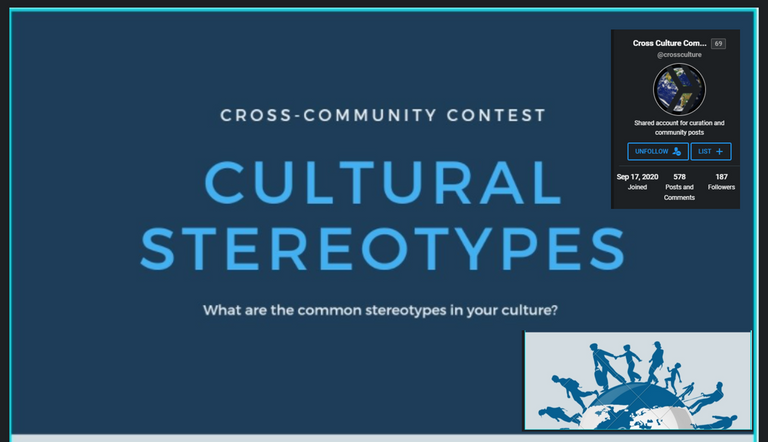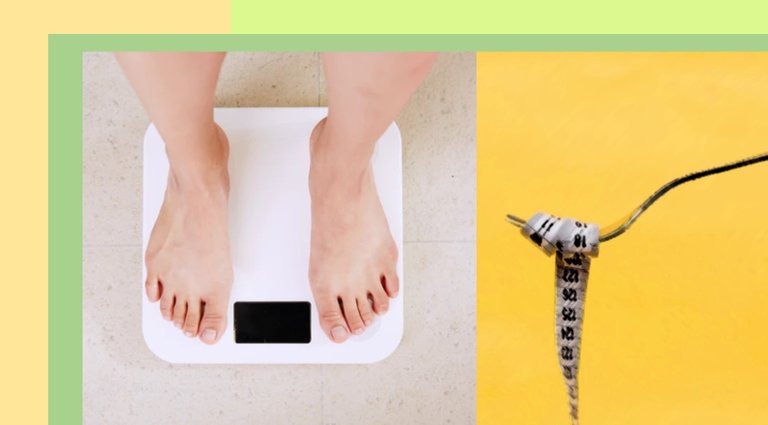
English Version

Hello everyone! I want to participate in this contest as I find it an interesting topic. At some point in our lives we are victims of stereotypes, I think it is a cruel way that human beings have to label others to, perhaps, hide some weakness of their own.
I invite @ismaelgranados and @yole.
From a very young age, stereotypes started to get in the way in my life. Thinking about it today, I can say that it wasn't easy for me to avoid being affected by it. All my life I was chubby, with cheeks and a belly. For that reason I was labeled "fat" which created a complex in me.

There was no more torture for me at school than when they came to pass the children to see which one was underweight to enroll them in the school canteen, which supported only children with malnutrition and very low family resources. The school nurse and the cook would line up the children and weigh them one by one to tell them their weight and if they were in the range of needing the cafeteria.
I always got in last in line and when it was my turn the cook would say: this child is not going to need it, or she would say things like: we shouldn't even weigh you. Those comments, which were funny to her, generated jokes and mockery among my classmates, which made me feel very bad. Fortunately, it was only twice a year that we went through that torture.
That label made me feel inhibited from doing many things I could have been good at, such as playing sports or enrolling in the school theater. I grew and developed and when I got to high school it was worse. It affected me so much that many times I didn't want to go to class, because teenagers have that emotional out of control that it is inevitable to suffer even for the smallest of problems. I remember that my mother talked to me a lot, she told me that you are not fat, you just have a few extra kilos, but that is not being fat, your classmates call you fat because they know it affects you and boys are like that, it is just to bother you. That gave me strength and kept me sane all through high school.
Then in college I lost a lot of weight. Actually my "fat" wasn't much so I never went on a diet, and the exercises I did at home were more for health and routine than to lose weight. But when I moved into my apartment it affected me living away from my family and I lost weight. Once again people started labeling me: you're too thin, that means you're sick. And it really wasn't like that I had only lost a few pounds and I felt very good about myself, so I decided not to pay attention to the harmful people who are just putting impossible stereotypes to make others uncomfortable.

Fuente

Another stereotype that made me a little uncomfortable at some point in my life was that of nationality and regionalism. I shared residence with a group of Venezuelans in Cuba and we were from all parts of Venezuela, I am from Táchira State, so in a matter of days they began to call me "la gocha", even some companions from Mérida State. One day they told me that it must be easy for me to prepare the sweet arepas because that was the only thing we ate in Táchira. Which is not true. But since those things no longer affect me because of the maturity and life experience I have acquired, I imposed respect and demanded that the label of "gocha" be removed.
Like many Venezuelans who have emigrated, I have also had labels in the country where I decided to live. "You are Colombian aren't you?" .... Because if you search San Cristobal on the internet you get Cucuta" "But that's the same being Venezuelan or Colombian" it's not like that, our Colombian partners and friends are our neighbors, but each one is of a different nationality.
In conclusion, to become happy and content with myself I decided not to think about the stereotypes that people impose. If you are fat they push you to be super thin, if you are thin they force you to gain weight, the same with the size, with the color of your skin, with the tasks you like like like cooking which is only for women, according to stereotypes, or construction which is only for men. Today I can say that stereotypes do not affect me because I understood that to give them importance is to live by and for others not for yourself.

I hope you like my participation in the contest. A thank you to everyone who stopped by to read and vote for my post. Leave a comment and I'll be happy to respond.
Ahora en Español

¡Hola a todos! Quiero participar en este concurso ya que me parece un tema interesante. En algún momento de nuestras vidas somos víctimas de los estereotipos, pienso que es una forma cruel que tiene el ser humano de etiquetar a otros para, tal vez, esconder alguna debilidad propia.
Invito a @ismaelgranados y a @yole
Desde muy niña los estereotipos empezaron a estorbar en mi vida. Pensando hoy en eso, puedo decir q no era fácil para mi evitar que me afectara. Toda mi vida fui rellenita, con cachetes y barriga. Por ese motivo fui etiquetada de “gorda” lo que llego a crear un complejo en mí.

No había más tortura para mí en la escuela que cuando llegaban a pasar a los niños para ver cual tenía bajo peso para inscribirlos en el comedor escolar, que apoyaba solo a los niños con desnutrición y muy bajos recursos familiares. La enfermera de la escuela y la cocinera hacían una fila de niños y nos pesaban uno por uno diciendo su peso y si estaba en el rango de necesitar el comedor.
Siempre me metía de última en la fila y cuando me tocaba el turno la cocinera decía: esta niña se ve que no lo va a necesitar, o decía cosas como: a ti no deberíamos ni pesarte. Esos comentarios que, para ella resultaban graciosos, generaban chistes y burlas entre mis compañeros, cosa que me hacía sentir muy mal. Afortunadamente era 2 veces al año que pasábamos por esa tortura.
Esa etiqueta llego a cohibirme de hacer muchas cosas en las que posiblemente hubiese sido buena, como practicar algún deporte o inscribirme en el teatro escolar. Fui creciendo y desarrollándome y cuando llegué a la secundaria fue peor. Me afectaba tanto que muchas veces no quería entrar a clase, porque los adolescentes tienen ese descontrol emocional que es inevitable sufrir hasta por el más pequeño de los problemas.
Recuerdo que mi mamá hablaba mucho conmigo, me decía tú no eres gorda solo tienes unos kilos de más, pero eso no es ser gorda, tus compañeros te dicen gorda porque saben que eso te afecta y los muchachos son así, es solo para molestarte. Eso me daba fuerza y me mantuvo con cordura todo el bachillerato.
Después en la universidad perdí mucho peso. Realmente mi “gordura” no era mucha así que nunca hice dieta, y los ejercicios que hacía en casa eran más por salud y rutina que por perder peso. Pero cuando me mudé a mi apartamento me afecto vivir lejos de mi familia y perdí peso. Una vez más las personas empezaron a etiquetarme: estas muy delgada eso es que estás enferma. Y realmente no era así solo había perdido unos kilos y me sentía muy bien conmigo misma, así que decidí no hacer caso a las personas nocivas que solo están poniendo estereotipos imposibles de cumplir para incomodar a los más.

Fuente
()

Otro estereotipo que me incomodó un poco en algún momento de mi vida fue el de la nacionalidad y regionalismo. Compartí residencia con un grupo de venezolanos en Cuba y éramos de todas partes de Venezuela, soy del Estado Táchira, así que en cuestión de días comenzaron a llamarme “la gocha”, incluso algunos compañeros del estado Mérida. Un día me dijeron que para mí debía ser fácil preparar las arepas dulces porque eso era lo único que comíamos en el Táchira. Cosa que no es cierto.
Pero como esas cosas no me afectan ya por la madurez y la experiencia de la vida que he adquirido impuse respeto y exigí que se me quitara la etiqueta de gocha.
Como muchos venezolanos que hemos emigrado, también he tenido etiquetas en el país donde decidí vivir. “¿Eres colombiana no? …. Porque si buscas San Cristóbal en internet te sale Cúcuta” “Pero eso es lo mismo ser venezolano o colombiano” no es así, nuestros compañeros y amigos colombianos son nuestros vecinos, pero cada uno es de una nacionalidad diferente.
En conclusión, para llegar a ser feliz y estar contenta conmigo misma decidí no pensar en los estereotipos que impone la gente. Si eres gordo te impulsan a ser súper delgado, si eres delgado te obligan a ganar peso, lo mismo con el tamaño, con el color de la piel, con las tareas que te gustan como la cocina que es solo para mujeres, según los estereotipos, o la construcción que es solo para hombres. Hoy en día puedo decir que los estereotipos no me afectan porque comprendí que darles importancia es vivir por y para los demás no para ti misma.

Que lamentable que hayas tenido que pasar por eso, sin embargo son experiencias que te han ayudado a fortalecer tú carácter. Ese tipo de estereotipos son muy dañinos, lamentablemente en los colegios (en general) no se preocupan por evitar este tipo de situaciones.
Excelente publicación 🤗
muchas gracias!....si es verdad por eso tenemos que estar atentos con nuestros muchachos...para que no sean victimas de estos estereotipos.
Si, y aún así es difícil porque escapa de nuestras manos controlar lo que hacen los otros niños en la escuela. Yo siempre estoy reafirmandole a mi hijo cosas sobre su personalidad, enseñándole a amarse tal y como es para que si algún día alguien llegará a meterse con él no le afecte.
I have always learned to mind my own business and not to give attention to what people say. People aren't satisfied with who we are or what we are. They are always complaining and will see reasons to stereotype you and make you feel bad and rejected.
I am glad you didn't allow that get into you again
With this, we would always stay happy when we do not give attention to them.
Me identifique mucho con las emociones escondidas tras tu post, senti que le hablabas a esa chiquita llena de inseguridades, y quiero contarte que desde pequeña he pasado por eso, pero a diferencia de ti, el estereotipo que mas me ha lastimado es el de "flaca". Trabajo en mi autoestima y autoaceptación para que no me afecte, pero aun me es incomodo usar ese tipo de ropa ajustada al cuerpo que me hace ver mucho mas delgada, porque siempre aparece alguien que me enfatiza las inseguridades. Gracias por compartir tu reflexion.
gracias a ti por pasar por mi blog.... y como ya dije en la publicación Jessica es imposible complacer a los demás y olvidarte de ti misma. seguro que cuando nadie te ve esa es tu ropa favorita. No prestes atención a los comentarios ajenos porque te frena de vivir feliz. Sonríe y les darás a entender que no te importa su opinión. Un abrazo infinito.
I love the way you ended the article... living with stereotype really mean you are living for people and not actually for yourself.
Thanks for participating in this contest.
Me encanta la forma en que terminaste el artículo ... vivir con estereotipo realmente significa que estás viviendo para las personas y no para ti mismo.
Gracias por participar en este concurso.
gracias a ti por leerme y por tu comentario.
thanks to you for reading me and for your comment.